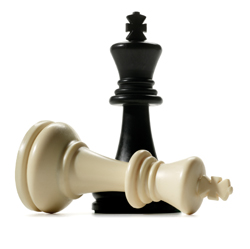EAT, DRINK & PLAY - ENTERTAINMENT
Last Glance
The King is Dead, Long Live The King
April, 2008 - Issue #42
 |
Those wishing to find him need only visit the town of Selfoss, Iceland, where his body was laid to rest on January 21. In kidney disease, the undisputed king of U.S. chess - the erstwhile and enigmatic world champion from Brooklyn - finally met an opponent against whom he couldn't even force a draw. He tipped his king at age 64.
Like other major newsbreaks in my life, I'll remember every detail about the moment I learned of his death. I was sitting exactly where I am now, at my desk at home, staring at my computer screen. Out the window I could see it had finally stopped raining.
Rain would have matched my mood better.
That his death hit me hard wasn't a surprise. For a number of reasons, my life has been tangled up in Bobby's. I knew about Bobby before I knew how to ride a bike. The year was 1973 and, thanks to Fischer, chess wasn't just mainstream, it was en vogue.
Americans old enough to remember 1972 already know why. That's the year Fischer, with the hopes of the entire Western world pinned squarely on his chess prowess, traveled to Reykjavik, Iceland and demolished the world chess champion from Russia, Boris Spassky. The three months those men wrestled over the chessboard represented a rarity in the Cold War: direct combat. East versus West.
When Fischer beat Spassky to become the first U.S. world champion since Paul Morphy in 1858, it was a national event. Forget Lake Placid. This was the first miracle on ice.
In Fischer's wake, chess became a U.S. sensation. Everybody was learning to play. I was caught up along with everyone else. I shared Bobby's name and, some hinted, maybe even his gift for the game.
Within weeks of learning I was beating my mom regularly, so I started playing against myself. On weekends I'd knock on doors, folded board in one hand and a burlap sack of pieces in the other, looking for opponents.
As a kindergartener, I begged my parents to take me to a tournament in Orange County. The field was for first and second graders, but tournament officials let me play. I came in second. Chess would bring many more trophies. By third grade I was the best player in my grade school and people were calling me "Fischer."
Time has since proven those people wrong, of course. I was no Fischer. Nobody was.
Chess connoisseurs will tell you that Bobby was an artist. He played a style of chess that was as beautiful as it was sparse. There was no fat in his game, no room for extravagance and yet always the potential for lightning in a bottle.
Few people ascend to the best in the world at anything. Fewer still achieve best-ever status. Bobby Fischer, world champion at age 29, captured both. He was a prodigy - a genius if ever there was one.
Fischer dropped out of sight shortly after beating Spassky. He didn't show up to defend his world title in 1975 and it fell back into the hands of the Russians. It's a sad footnote in history that Anatoly Karpov, Fischer's successor, played so brilliantly throughout his career but never managed to escape Fischer's shadow. Perhaps that was Fischer's most brilliant move of all - walking away from the game at his peak and thus assuring that his reign as people's champ would never end. Garry Kasparov did what he could to supplant
Fischer in the hearts of chess fans, holding the world title from 1985-2000 and surpassing Fischer's as the highest-rated player ever.
Most damage to Fischer's legacy, though, was perpetuated by Fischer himself. After resurfacing in the '90s, he began spouting anti-Semitic comments with impunity, despite being Jewish himself. He played a 1992 rematch with Spassky in Yugoslavia in violation of a strict U.N. embargo.
At one point, journalist Dick Schapp, a former friend to Fischer, wrote in a piece that Bobby didn't have "a sane bone in his body." Some criticized Schapp for the comment, including Fischer, who accused him of turning his back on him.
None of that matters now. Fischer is gone. A recluse most of his life, what most of us will remember about him is 1972. What will last beyond what he did or said are his games.
I, like so many chess fans, own all the anthologies.
How could I not? Fischer, whatever else he might have been, was a virtuoso of chess. Players will study his games the way classical pianists listen to Chopin; the way sculptors study Rodin.
For generations of players to come, his games will be an expedition. They'll pore over every tactic. They'll ponder every strategy. Always, they'll be searching... not for Bobby Fischer the man... but for a piece of his genius.
|
||||||||||||||||||||||||||||





